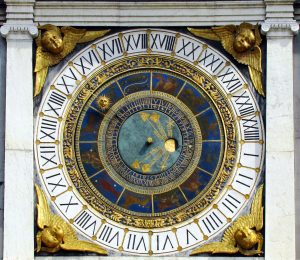
“Time” is polysemic, we use it every day lightly and spontaneously, not stopping to think about the shades of its meaning: chronological time, atmospheric time, verbal time and musical time, spheres included in the Latin tempus, except for the climatic one.
We want to follow two moments in tracing the history of time: the first, from the ancient Greek temnomeaning “to separate” and “to divide”, which leads to an idea of section, of period. A word that in turn has Greek origins (periodos; perì: around; odos: road), which has the meaning of a road that goes around, of a circle.
The second period can be found in Sanskrit Tapas, which means “heat”, linked to the root Tap, which means “to warm up”, “to give heat”, but also “to shine” and “to burn”, consequently the meaning of burning past karma and purifying oneself.
The Greek etymology opens the door to linearity, with temno, the sectioning of moments in succession, thus a process of the rational mind; and to cyclicity, with periodos, the cosmic time of the laws of Nature; the Sanskrit root, on the other hand, links the cosmic to the human, introducing the dimension of suffering and purification.
In this pandemic year, people have been talking about their lives before and after Covid-19: the virus was a threshold-event. You can say ‘life before Covid-19 and after Covid-19’, as we consider the descent of Christ, a threshold-event. We have experienced cosmic tempus that did not stop: Earth imperturbably went around the Sun, allowing the seasons to succeed each other and the life cycle to happen; on the other hand, the personal tempus came to a halt, or at least advanced with hiccup. It has been a year of suffering, both for those whose health, work, and affections have been touched by the black cloak of the virus, and for those who have ‘only’ had to experience the limitations on their freedom. The pandemic has dealt a blow to the idea of time as progress, to the idea of scientific omnipotence, revealing the need for sympathetic attention to human time, whether it be a time of health or illness, of joy or mourning, of boredom, of waiting, of hope. Compared to an idea linked to chronological time, the other side of time has manifested itself, the cyclical cosmic that acts and the human and is directed towards a new life.
Please leave us one word for your ‘feeling of time’ in this pandemic year.
